COVID-19 and Anxiety

Healing justice for equity
 In the conversations and efforts surrounding equity, we hear a lot about structural racism. Racism is a system of inequity, made up of interconnected and interdependent structures, such as education, healthcare, and criminal justice.
In the conversations and efforts surrounding equity, we hear a lot about structural racism. Racism is a system of inequity, made up of interconnected and interdependent structures, such as education, healthcare, and criminal justice.
Our rules, laws, policies, customs, and cultures (especially amongst groups), inform how different structures relate to each other, as well as our interpersonal and institutional relationships.
The whole system not only creates inequities, it prevents any equity from emerging.
A primer on systems
To have a working understanding of equity, it is helpful to have an understanding of systems, specifically their inherent patterns and relationships. We’re all intimately familiar with at least one system: our bodies, which we can leverage as an example of how systems work. Our bodies have a network of structures - such as our bones, organs, nerves - which ensure that our systems are operating as they should. And these systems are interconnected and interdependent, meaning that if something happens in one system it can have an impact on another system. This is what is happening with the system of racism.
Impact of racism
One way racism and its structures of inequity can show up in our personal and interpersonal lives is through racialized socioeconomic stress. According to the American Psychological Association (APA), stress is the physiological demand placed on the body when we must adapt, cope, or adjust. Acute stress can be both healthy and necessary in keeping us alive; but chronic (intense or prolonged) stress can be overwhelming to our body. A key cause of chronic stress, according to the APA, is discrimination, including discrimination based on race, gender, ability, and sexual orientation.
Stress (more specifically, stress hormones that don’t get cleared or metabolized from our body) can lead to short and long-term health impacts. Stress can limit our ability to access our best judgement and decision-making. It can stifle creativity and imagination by restricting access to those parts of our brain. Stress can also prevent us from being able to access our compassion and empathy, which are important for connecting with others and being in relationships. In short, individuals directly impacted by systemic racism suffer the effects physically, mentally, emotionally, socially, and spiritually.
What is healing justice?
Healing justice, a term made popular by Cara Page, is a framework designed to acknowledge and transform the consequences of racism and oppression. It offers a holistic approach to address stress and heal historic/generational and contemporary trauma.
Healing justice uses a community-centered approach to heal collectively. It focuses on addressing the impact of trauma through the care and accountability of group members. And it does this so participants can do the work of envisioning a truly equitable world.
Healing justice is the practice of reimagining wholeness at the intersection of intergenerational trauma, current structures of oppression, and a generative and co-created future. We hold that joy and pleasure create possibility to be in right relationship with ourselves, each other, and the land. We strive to demystify medicine and healing, and to make them accessible to everyone. We believe that each person is an expert of their own experience, body and needs, and that it is necessary to address the roots of trauma and injustice for individual and collective transformation.
The healing justice approach
When we are feeling threatened or stressed, our brain pulls us into a survival response: fight or flight. This doesn’t just happen when we’re threatened physically. Our brains can pull us into fight or flight when we feel psychologically threatened, such as when our values or beliefs are challenged.
A healing justice approach gives us the ability to address this stress, so we can stay with discomfort, allow challenges to our values and beliefs, and do the essential work of personal change. It allows us to access our compassion and empathy, to connect with others and be in relationship, so we are able to engage deeply in dialogue and work towards equity.
Healing justice practice gives us the energy to make sustained effort toward the change we want to see (and be) in the world. Just as a farmer enriches his soil before planting, we need to ensure that our soil (our own mental and physical energy, as well as our society’s rules, laws, policies, customs, and cultures) can nourish the seeds of equity that we plant, so they can grow healthy and last.
Healing Justice Practice Space Principles and Guidelines
Healing Justice Detroit provides a set of wonderful guidelines that begin:
-
We begin by listening.
-
We honor individual and community agency, intuition, and innate wisdom, and therefore honor people’s rights to make decisions about their own bodies.
How healing justice can further equity and community wellbeing
Healing justice seeks to transform oppression, bring reconciliation and resilience, and allow for reimagining our communities and our broader society.
What might it look and feel like to move through society knowing that its rules, laws, policies, customs, and culture were intentionally designed to care for you and all beings? A society where access to safe housing, responsive healthcare, and quality education was not dictated by identity?
Imagine a society where oppression and discrimination are reduced, chronic socioeconomic stress is minimized, leading to better overall health, quality of life, and life expectancy for all. Envisioning ways to achieve that individually and collectively is the work of healing justice.
What you can do
Healing justice is a framework that makes space for individual, community, organizational, and systemic practice, making it easy to adopt wherever you are. The work is especially beneficial in community healing justice spaces, and we suggest some resources in the References.
However you can do much of the work on your own. For individuals, the most meaningful actions you can take are:
- Begin and sustain an individual healing practice, such as meditation, gratitude, movement, or rituals
- Educate yourself about systematic racism and oppression and build awareness of others’ lived experience (building an understanding of systems and structures and how they work differently for different groups)
- Intervene and speak up when you see injustice
- Engage—advocate for change, vote, write letters
Remember, whether you engage in community or on your own, to bring compassion, self-compassion, and empathy to this work of healing ourselves and our communities.
American Psychological Society. (2016 ). Stress In America: The Impact of Discrimination. Stress in America Survey. Accessed December 2020 at https://www.apa.org/news/press/releases/stress/2015/impact-of-discrimination.pdf
American Psychological Society. (2018). Stress Effects on the Body. Accessed December 2020 at https://www.apa.org/topics/stress-body#:~:text=When%20the%20body%20is%20stressed,tension%20when%20the%20stress%20passes.
Astraea Lesbian Foundation for Justice has a list of resources on healing justice.
Cara Page is one of the architects of the healing justice political strategy.
Healing Justice Detroit offers a definition, guidelines for healing justice spaces and resources.
Irresistible offers a media archive of healing justice practices including book club topics connected to healing justice


